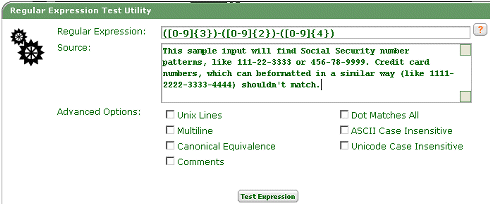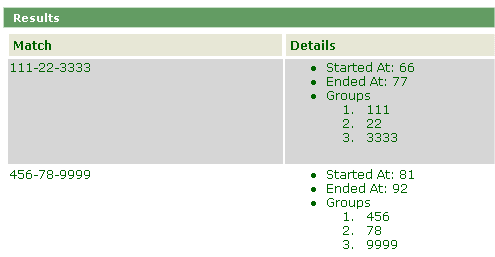|
Use the Regular Expression tester to test whether a text pattern matches the regular expression.
5. Complete the detail form.
Field |
Description |
| Regular Expression |
Enter a regular expression to be used, using syntax
conforming to the |
| Source |
Enter source text to be searched for matches to the regular expression. |
| UNIX Lines |
Select to recognize only newline characters (/n, also called line feed) as end-of-line delimiters. Clear to recognize additional characters or character pairs as end-of-line delimiters: carriage return (/r), carriage return followed by newline, next-line (/u0085), line-separator (/u2028) and paragraph-separator (/u2029). |
| Multilines |
Select to cause the expressions ^ and $ to match immediately after or immediately before, respectively, a line terminator or the end of the input sequence. Clear to have these expressions only match at the beginning and the end of the entire input sequence |
| Canonical Equivalence |
Select to cause two characters to considered to match if, and only if, their full canonical decompositions match. The expression "a/u030A", for example, matches the string "?" when this flag is specified. By default, matching does not take canonical equivalence into account. |
| Comments |
Select to ignore all white space (tabs and spaces) within the Source text, and to ignore all material starting with a comment character # through the end of the line. |
| Dot Matches All |
Select to indicate that a period character is to match any character including a line terminator. Clear to indicate that a period character is to match any character except a line terminator. |
| ASCII Case Insensitive |
Select to match uppercase with lowercase ASCII characters. |
| Unicode Case Insensitive |
Select to match uppercase with lowercase ASCII characters. |
6. Click Test Expression .
7. A table of results lists each match of the regular expression found in the Source text.
This regular expression matches the format of Social Security Numbers in the United States:


|
|
free text rules, regular expression |
|
|
About Transform rules |